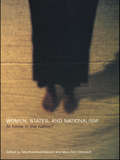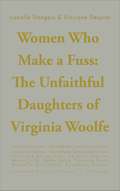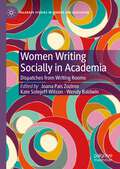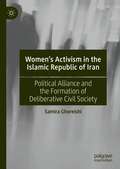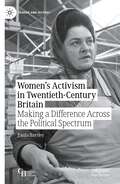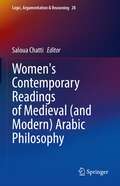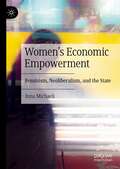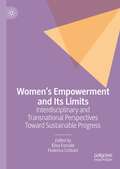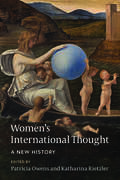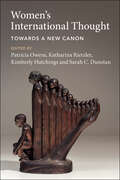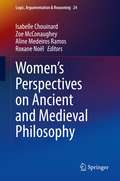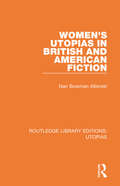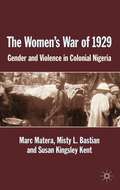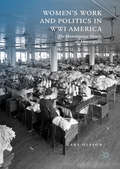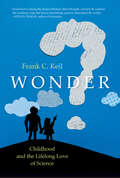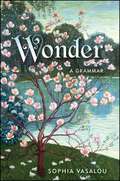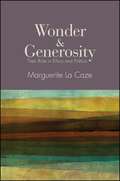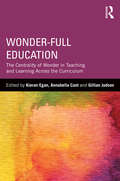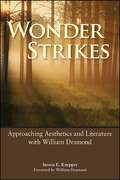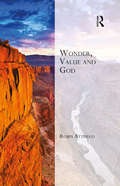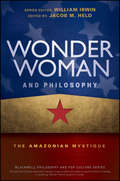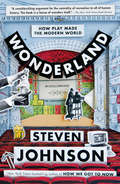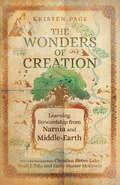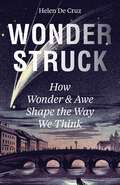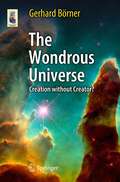- Table View
- List View
Women, States and Nationalism: At Home in the Nation?
by Sita Ranchod-Nilsson Mary Ann TétreaultWomen, States and Nationalism counters this attitude and examines the many and contradictory ways in which women negotiate their places in 'the nation'. The volume includes theoretical essays that explore the multiple ways in which the very concept of 'nation' is based upon notions of family, sexuality and gender power which are often overlooked of downplayed by 'male-stream' scholarship. It gathers together an outstanding panel of feminist scholars and area studies specialists, who, through a series of focused case studies, analyse diverse issues which include;*gender and sectarian conflict in Northern Ireland*the paradox of Israeli women soldiers*women, civic duty and the military in the USA*the Hindu Right in India*power, agency and representation in Zimbabwe*political identity and heterosexism.This timely volume is a highly valuable resource for students and scholars of Nationalism, Internationalism Studies and Women's Studies.
Women Who Make a Fuss: The Unfaithful Daughters of Virginia Woolf
by Isabelle Stengers Vinciane Despret April KnutsonVirginia Woolf, to whom university admittance had been forbidden, watched the universities open their doors. Though she was happy that her sisters could study in university libraries, she cautioned women against joining the procession of educated men and being co-opted into protecting a "civilization" with values alien to women. Now, as Woolf's disloyal (unfaithful) daughters, who have professional positions in Belgian universities, Isabelle Stengers and Vinciane Despret, along with a collective of women scholars in Belgium and France, question their academic careers and reexamine the place of women and their role in thinking, both inside and outside the university. They urge women to heed Woolf's cry--Think We Must--and to always make a fuss about injustice, cruelty, and arrogance.
Women Writing Socially in Academia: Dispatches from Writing Rooms (Palgrave Studies in Gender and Education)
by Joana Pais Zozimo Kate Sotejeff-Wilson Wendy BaldwinThis book offers a multifaceted perspective on social writing in a volatile, uncertain and complex world. It meets the need to enable women’s capacity, especially in academic settings, to structure their own writing practice and that of others in the community. It expands current research on social writing beyond its core context in English-speaking countries to multilingual contexts from Portugal to Finland, identifying fruitful areas for interdisciplinary research, nexuses of social practice, and strategies for situated social learning through a feminist lens, bringing women from the margins to the centre. As the average woman academic with children is losing an hour of research and writing time every day in the aftermath of the Covid-19 pandemic, the impact of which will be felt for decades, the book purposefully entwines these polyphonic voices to tell the story of a writing retreat as a space for leadership and empowerment.
Women’s Activism in the Islamic Republic of Iran: Political Alliance and the Formation of Deliberative Civil Society
by Samira GhoreishiThrough an intersectional feminist re-reading of the Habermasian theoretical framework, this book analyses how women's activism has developed and operated in the Islamic Republic of Iran. Chapters look at three key areas of women's activism in Iran: how women deliberately engaged with media activism despite the government's controlling and repressive policies; women's involvement in civil society organisations, institutions and communities, and cooperation through multilevel activism; and women's activism in the political sphere and its connection with media and civil society activism despite the theocratic system. Drawing upon interviews, analyses of journal and newspaper articles and documentary/non-documentary films, as well as personal experiences, observations and communications, the book examines to what extent Iranian women's rights' groups and activists have collaborated not only with each other but with other social groups and activists to help facilitate the formation of a pluralist civil society capable of engaging in deliberative processes of democratic reform.This book will be of interest to scholars in Gender Studies and Middle Eastern Studies, particularly those who study women's and other social movements in Iran.
Women’s Activism in Twentieth-Century Britain: Making a Difference Across the Political Spectrum (Gender and History)
by Paula BartleyThis book serves as an introduction to the extraordinary diversity of women’s activism. Paula Bartley's original research is supported by a range of writing to provide a powerful impression of the actions taken by groups of women from across the social and political spectrum, making the book invaluable to both students and interested readers. These women set out to make a difference to their locality, their country and sometimes the world. The story of women’s activism embodies stimulating accounts of progress and reversals, of commitment and uncertainty, of competing rights and challenging wrongs. The story of women’s activism is not tidy or well-ordered. It is messy and unorthodox. And full of surprises.
Women's Contemporary Readings of Medieval (Logic, Argumentation & Reasoning #28)
by Saloua ChattiThis book explores a large variety of topics involved in Arabic philosophy. It examines concepts and issues relating to logic and mathematics, as well as metaphysics, ethics and aesthetics. These topics are all studied by different Arabic philosophers and scientists from different periods ranging from the 9th century to the 20th century, and are representative of the Arabic tradition. This is the first book dealing with the Arabic thought and philosophy and written only by women. The book brings together the work and contributions of an international group of female scholars and researchers specialized in the history of Arabic logic, philosophy and mathematics. Although all authors are women, the book does not enter into any kind of feminist trend. It simply highlights the contributions of female scholars in order to make them available to the large community of researchers interested in Arabic philosophy and to bring to the fore the presence and representativeness of female scholars in the field.
Women's Economic Empowerment: Feminism, Neoliberalism, and the State
by Inna MichaeliChallenging the simplistic story by which feminism has become complicit in neoliberalism, this book traces the course of globalization of women’s economic empowerment from the Global South to the Global North and critically examines the practice of empowering low-income women, primarily migrant, indigenous and racialised women. The author argues that women’s economic empowerment organizations become embedded in the neoliberal re-organization of relations between civil society, state and market, and in the reconfiguration of relations between the personal and the political. Also examined are the contractual nature of institutional arrangements in neoliberalism, the ontological divide between economy and society, and the marginalisation of feminist economics that persists in the field of women’s economic empowerment. The book will be of interest to scholars and students of social sciences, gender studies, sociology, and economics. This book is based on the author’s doctoral dissertation at the Humboldt University of Berlin, Faculty of Humanities and Social Sciences.
Women’s Empowerment and Its Limits: Interdisciplinary and Transnational Perspectives Toward Sustainable Progress
by Elisa Fornalé Federica CristaniBringing together a range of scholarship, this edited volume investigates the limits and boundaries of women’s empowerment toward shaping sustainability by unpacking power relationships that affect women’s inclusive citizenship; analyzing concrete examples of limits across different regions; and exploring the rise of new technological innovations that may (or may not) contribute to dissolve those limits. Chapters focus on different dimensions related disempowerment (such as historical, cultural, socio-economic, and normative) to frame a new understanding of how achieving equality around the world. Integrating transnational and interdisciplinary perspectives at domestic and international levels, this book looks at ways to provide new opportunities for removing invisible and visible barriers to ensure gender parity and to make sustainable change irreversible. This book will be of interest to scholars, students, and policymakers across Law, Sociology, Gender Studies, Politics, and Economics.
Women's International Thought: A New History
by Patricia Owens Katharina RietzlerWomen's International Thought: A New History is the first cross-disciplinary history of women's international thought. Bringing together some of the foremost historians and scholars of international relations working today, this book recovers and analyses the path-breaking work of eighteen leading thinkers of international politics from the early to mid-twentieth century. Recovering and analyzing this important work, the essays offer revisionist accounts of IR's intellectual and disciplinary history and expand the locations, genres, and practices of international thinking. Systematically structured, and focusing in particular on Black diasporic, Anglo-American, and European historical women, it does more than 'add women' to the existing intellectual and disciplinary histories from which they were erased. Instead, it raises fundamental questions about which kinds of subjects and what kind of thinking constitutes international thought, opening new vistas to scholars and students of international history and theory, intellectual history and women's and gender studies.
Women's International Thought: Towards a New Canon
by Patricia Owens Katharina Rietzler Kimberly Hutchings Sarah C. DunstanThis first anthology of women's international thought explores how women transformed the practice of international relations, from the early to mid-twentieth century. Revealing a major distortion in current understandings of the history and theory of international relations, this anthology offers an alternative 'archive' of international thought. By including women as international thinkers it demonstrates their centrality to early international relations discourses in and on the Anglo-American world order and how they were excluded from its history and conceptualization. Encompassing one hundred and four selections by ninety-two different thinkers, including Anna Julia Cooper, Margaret Sanger, Rosa Luxemburg, Judith Shklar, Hannah Arendt, Merze Tate, Susan Strange, Lucy P. Mair and Claudia Jones, it covers the widest possible range of subject matter, genres, ideological and political positions, and professional contexts. Organised into thirteen thematic sections, each with a substantial introductory essay, the anthology provides intellectual, political, biographical context, and original arguments, showing women's significance in international thought.
Women's Perspectives on Ancient and Medieval Philosophy (Logic, Argumentation & Reasoning #24)
by Zoe McConaughey Isabelle Chouinard Aline Medeiros Ramos Roxane NoëlThis book promotes the research of present-day women working in ancient and medieval philosophy, with more than 60 women having contributed in some way to the volume in a fruitful collaboration. It contains 22 papers organized into ten distinct parts spanning the sixth century BCE to the fifteenth century CE.Each part has the same structure: it features, first, a paper which sets up the discussion, and then, one or two responses that open new perspectives and engage in further reflections. Our authors’ contributions address pivotal moments and players in the history of philosophy: women philosophers in antiquity, Cleobulina of Rhodes, Plato, Lucretius, Bardaisan of Edessa, Alexander of Aphrodisias, Plotinus, Porphyry, Peter Abelard, Robert Kilwardby, William Ockham, John Buridan, and Isotta Nogarola. The result is a thought-provoking collection of papers that will be of interest to historians of philosophy from all horizons. Far from being an isolated effort, this book is a contribution to the ever-growing number of initiatives which endeavour to showcase the work of women in philosophy.
Women's Utopias in British and American Fiction (Routledge Library Editions: Utopias)
by Nan Bowman AlbinskiUtopian writing offers a fascinating panorama of social visions; and the related forms of dystopia and anti-utopian satire extend this into the range of social nightmares. Originally published in 1988, this comparative study of utopian fiction by British and American women writers demonstrates the continuity of a well-established, but little-known, tradition, emphasising its range and diversity, and providing ample evidence of women’s aspirations and documenting the restrictions and exclusions in private and public life that their novels challenge. Historically, the growth of each national tradition is traced in relation to social and political movements, particularly the suffrage movement and contemporary feminism. Comparatively, the quite different responses of British and American women to what are in many instances the same social problems are examine in the light of changing expectations. Definitions of human nature and gender relationships are assessed on a nature/culture continuum as a means of understanding this change. Women’s attitudes to their social and political roles, their working lives, to sexuality, marriage and the family are reflected in their visions of fruitful change; and so also is the impact of two world wars, socialism and fascism, the debate on peaceful uses of nuclear energy and fears of a nuclear holocaust.
The Women’s War of 1929
by Marc MateraIn 1929, tens of thousands of south eastern Nigerian women rose up against British authority in what is known as the Women's War. This book brings togther, for the first time, the multiple perspectives of the war's colonized and colonial participants and examines its various actions within a single, gendered analytical frame.
Women's Work and Politics in WWI America: The Munsingwear Family of Minneapolis
by Lars OlssonBy World War I, the Northwestern Knitting Company was the largest workplace for gainfully employed women in Minnesota and the largest garment factory in the United States. Lars Olsson investigates the interplay of class, gender, marital status, ethnicity, and race in the labor relations at the factory, illuminating the lives of the women who worked there. Representing thirty nationalities, particularly Scandinavian, the women worked long hours for low pay in roles that were strictly divided along ethnic and gendered lines, while the company directors and stockholders made enormous profits off of their labor. Management developed paternal strategies to bind the workers to the company and preempt unionization, including bonus programs, minstrel shows, and a pioneering industrial welfare program. With the US entry into the war, the company was contracted to produce underwear for soldiers, and management expanded the metaphor of "the Munsingwear Family" to construct not just company loyalty, but national loyalty. This book sheds new light on women's labor in WWI and the lives of textile workers in the United States.
Wonder: Childhood and the Lifelong Love of Science
by Frank C. KeilHow we can all be lifelong wonderers: restoring the sense of joy in discovery we felt as children.From an early age, children pepper adults with questions that ask why and how: Why do balloons float? How do plants grow from seeds? Why do birds have feathers? Young children have a powerful drive to learn about their world, wanting to know not just what something is but also how it got to be that way and how it works. Most adults, on the other hand, have little curiosity about whys and hows; we might unlock a door, for example, or boil an egg, with no idea of what happens to make such a thing possible. How can grown-ups recapture a child&’s sense of wonder at the world? In this book, Frank Keil describes the cognitive dispositions that set children on their paths of discovery and explains how we can all become lifelong wonderers. Keil describes recent research on children&’s minds that reveals an extraordinary set of emerging abilities that underpin their joy of discovery—their need to learn not just the facts but the underlying causal patterns at the very heart of science. This glorious sense of wonder, however, is stifled, beginning in elementary school. Later, with little interest in causal mechanisms, and motivated by intellectual blind spots, as adults we become vulnerable to misinformation and manipulation—ready to believe things that aren&’t true. Of course, the polymaths among us have retained their sense of wonder, and Keil explains the habits of mind and ways of wondering that allow them—and can enable us—to experience the joy of asking why and how.
Wonder: A Grammar
by Sophia VasalouWonder has been celebrated as the quintessential passion of childhood. From the earliest stages of our intellectual history, it has been acclaimed as the driving force of inquiry and the prime passion of thought. Yet for an emotion acknowledged so widely for the multiple roles it plays in our lives, wonder has led a singularly shadowy existence in recent reflections. Philosophers have largely passed it over in silence; emotion theorists have shunned it as a case that sits awkwardly within their analytical frameworks. So what is wonder, and why does it matter? In this book, Sophia Vasalou sketches a "grammar" of wonder that pursues the complexities of wonder as an emotional experience that has carved colorful tracks through our language and our intellectual history, not only in philosophy and science but also in art and religious experience. A richer grammar of wonder and broader window into its past can give us the tools we need for thinking more insightfully about wonder, and for reflecting on the place it should occupy within our emotional lives.
Wonder and Generosity: Their Role in Ethics and Politics
by Marguerite La CazeWonder and Generosity provides a fresh account of how the passions of wonder—based on accepting others' differences—and generosity—based on self-respect and mutual respect—can supplement each other to establish an ethics and politics of respect for sexual and cultural differences. Drawing on the work of both historical and contemporary thinkers, such as Descartes, Kant, Beauvoir, Arendt, Irigaray, and Derrida, Marguerite La Caze applies her theoretical framework to a range of contemporary political challenges, including asylum-seeker policies, justice for indigenous and other oppressed groups, debates over official apologies, gender equality, and responses to radical evil. La Caze's book contributes to understanding the relationship between equality and difference in public life, the extent to which we must regard others as similar in the name of equality, and the extent to which we must acknowledge significant differences.
Wonder-Full Education: The Centrality of Wonder in Teaching and Learning Across the Curriculum
by Kieran Egan, Annabella Cant and Gillian JudsonFor many children much of the time their experience in classrooms can be rather dull, and yet the world the school is supposed to initiate children into is full of wonder. This book offers a rich understanding of the nature and roles of wonder in general and provides multiple suggestions for to how to revive wonder in adults (teachers and curriculum makers) and how to keep it alive in children. Its aim is to show that adequate education needs to take seriously the task of evoking wonder about the content of the curriculum and to show how this can routinely be done in everyday classrooms. The authors do not wax flowery; they present strong arguments based on either research or precisely described experience, and demonstrate how this argument can be seen to work itself out in daily practice. The emphasis is not on ways of evoking wonder that might require virtuoso teaching, but rather on how wonder can be evoked about the everyday features of the math or science or social studies curriculum in regular classrooms.
Wonder Strikes: Approaching Aesthetics and Literature with William Desmond
by Steven E. KnepperWilliam Desmond argues that philosophy, religion, and art begin in wonder. Desmond is widely recognized for his original metaphysics and his provocative philosophy of religion. Desmond's extensive writings on aesthetics, art, and literature, however, have received much less attention. Wonder Strikes is the first book-length examination of these dimensions of Desmond's thought. It offers nuanced commentary on his treatment of beauty and the sublime; his accounts of tragedy and comedy; and his argument that, having asked "too much" of art in modernity, we now ask "too little." Desmond claims that art, philosophy, and religion must recover their ancient kinship and their shared roots in wonder if they are to counter the destructive instrumentalism of our time.
Wonder, Value and God: The Philosophy And Theology Of Creation Inspiration And Creativity (Transcending Boundaries in Philosophy and Theology)
by Robin AttfieldThis book relates the value present in the natural world and in human creativity to an underlying purpose which it traces in creation. It opens by invoking the wonder aroused by nature's value and celebrated by poets, and moves to a cosmic purpose as the best explanation of this value. Natural evils are considered and set in their evolutionary context. Human creativity is later related to inspiration, and to traditional theistic teaching about the purpose of human life. Criticisms of "the value approach" are considered, together with the quest for meaning, and fears that Darwinism undermines it, which are found to be illusory. New ground is broken through this response to the spectre of bleakness. The author's previous studies of meaningful work are applied to the question of the nature of a worthwhile life and life's meaning. While the world's value is argued to point to creation by a transcendent lover of value, human beings are shown to be capable of augmenting that value through their creativity (not least through activities such as craftsmanship and gardening). In integrating the themes of value, creativity and purpose, the book contributes a new synthesis to the literature of philosophy, environmental studies and theology.
Wonder Woman and Philosophy: The Amazonian Mystique (The Blackwell Philosophy and Pop Culture Series)
by William IrwinWonder Woman and Philosophy: The Amazonian Mystique explores a wide range of philosophical questions surrounding the most popular female superhero of all time, from her creation as feminist propaganda during World War II up to the first female lead in the blockbuster DC movie-franchise. The first book dedicated to the philosophical questions raised by the complex and enduringly iconic super-heroine Fighting fascism with feminism since 1941, considers the power of Wonder Woman as an exploration of gender identity and also that of the human condition – what limits us and what we can overcome Confronts the ambiguities of Wonder Woman, from her roles as a feminist cause and fully empowered woman, to her objectification as sexual fantasy Topics explored include origin stories and identity, propaganda and art, altruism and the ethics of care, Amazonians as transhumanists, eroticism and graphic novels, the crafting of a heroine, domination, relationships, the ethics of killing and torture, and many more.
Wonderland: How Play Made the Modern World
by Steven JohnsonFrom the New York Times-bestselling author of How We Got to Now and Where Good Ideas Come From, a look at the world-changing innovations we made while keeping ourselves entertained. This lushly illustrated history of popular entertainment takes a long-zoom approach, contending that the pursuit of novelty and wonder is a powerful driver of world-shaping technological change. Steven Johnson argues that, throughout history, the cutting edge of innovation lies wherever people are working the hardest to keep themselves and others amused. Johnson's storytelling is just as delightful as the inventions he describes, full of surprising stops along the journey from simple concepts to complex modern systems. He introduces us to the colorful innovators of leisure: the explorers, proprietors, showmen, and artists who changed the trajectory of history with their luxurious wares, exotic meals, taverns, gambling tables, and magic shows. Johnson compellingly argues that observers of technological and social trends should be looking for clues in novel amusements. You'll find the future wherever people are having the most fun.From the Hardcover edition.
The Wonders of Creation: Learning Stewardship from Narnia and Middle-Earth (Hansen Lectureship Series)
by Kristen PageWhen an author of fiction employs the imagination and sets characters in a new location, they are in a sense creating a world. Might such fictional worlds give us a deeper appreciation for our own?Many readers have found themselves, like the Pevensie children, transported by C. S. Lewis into Narnia, and they have traveled from Lantern Waste to Cair Paravel and the edge of the sea. Thanks to J. R. R. Tolkien, readers have also journeyed with Bilbo, Frodo, and their companions across Middle-earth from the Shire to the Lonely Mountain, the forest of Mirkwood, the mines of Moria, and the very fires of Mount Doom. But as often as we enter these fictional worlds as readers, we eventually return to our world refreshed with sharpened insight.The Wonders of CreationBased on the annual lecture series hosted at Wheaton College's Marion E. Wade Center, volumes in the Hansen Lectureship Series reflect on the imaginative work and lasting influence of seven British authors: Owen Barfield, G. K. Chesterton, C. S. Lewis, George MacDonald, Dorothy L. Sayers, J. R. R. Tolkien, and Charles Williams.
Wonderstruck: How Wonder and Awe Shape the Way We Think
by Helen De CruzA philosopher explores the transformative role of wonder and awe in an uncertain worldWonder and awe lie at the heart of life&’s most profound questions. Wonderstruck shows how these emotions respond to our fundamental need to make sense of ourselves and everything around us, and how they enable us to engage with the world as if we are experiencing it for the first time.Drawing on the latest psychological insights on emotions, Helen De Cruz argues that wonder and awe are emotional drives that motivate us to inquire and discover new things, and that humanity has deliberately nurtured these emotions in cultural domains such as religion, science, and magic. Tracing how wonder and awe unify philosophy, the humanities, and the sciences, De Cruz provides new perspectives on figures such as Plato, Aristotle, Adam Smith, William James, Rachel Carson, Maurice Merleau-Ponty, Jean-Paul Sartre, and Abraham Heschel. Along the way, she explains how these singular emotions empower us to be open-minded, to experience joy and hope, and to be resilient in the face of personal troubles and global challenges.Taking inspiration from Descartes&’s portrayal of wonder as &“that sudden surprise of the soul,&” this illuminating book reveals how wonder and awe are catalysts that can help us reclaim what makes life worth living and preserve the things we find wonderful and valuable in our lives.
The Wondrous Universe
by Gerhard BörnerThe world as it is viewed from modern physics and cosmology has many strange and unexpected features. Often these are in stark contrast with our everyday experience or our preconceptions, such as the concept of space and time as finite and changeable. Nevertheless it is this strange world which is the fundamental basis of our existence. Therefore modern science also has a few things to say about the age-old questions: Who are we? - Where do we come from? - Where are we going? The author, an experienced scientist and teacher, presents the knowledge that we have about our world for non-experts. He takes us on a journey through cosmology and the quantum world of elementary particles. And he sketches the impact of the insights gained into philosophical assumptions and religious beliefs in these disciplines. In the end he asks the speculative question whether there is something beyond the limits of the natural sciences.
